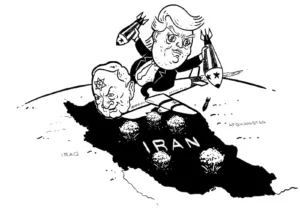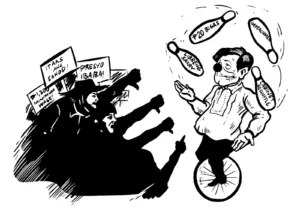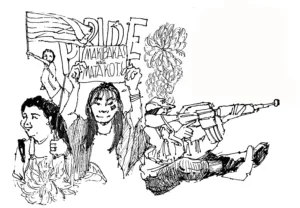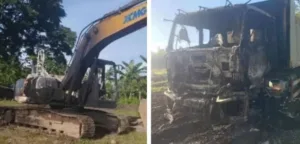Contribution to the Fourth New World Summit
Brussels, Belgium
By CONI K. LEDESMA
International Spokesperson
Makabayang Kilusan ng Bagong Kababaihan
Good afternoon, dear friends and comrades.
It is a great honor for me to participate in the fourth New World Summit – Brussels, and for me to speak under the section of Progressive State.
I would like to thank and congratulate Jonas Staal, Robert Kluijver, Younes Bouadi, Reneé in der Maur, Paul Kuipers, and everyone else who worked so hard to make this fourth New World Summit a success.
Today I will speak about the progressive state developing in the Philippines today.
We have been waging our national democratic struggle for more than four and a half decades. Our struggle started in the 1960s when a group of Marxist-Leninist-Maoists led by Professor Jose Maria Sison identified the character of Philippine society as semi-colonial and semi-feudal, and put forward the general line of the national democratic revolution against US imperialism, feudalism and bureaucrat capitalism.
In 1968, the Communist Party of the Philippines was re-established. A Program for a People’s Democratic Revolution was promulgated. In March 1969, the New People’s Army was established to defend the people against injustice and tyranny, and to fight for the realization of the People’s Democratic Government.
Since then a parallel state of the people is being built. It’s presence is now in 71 out of 81 provinces in the country.
While the reactionary state still exists, the people’s democratic government is steadily growing in the countryside. Local organs of democratic political power are being established. The barrio (village) organizing committees and barrio revolutionary committees in these areas have special committees for organization, economy, defense, justice, health, education, and so on.
Supporting the people’s government are basic organizations of workers, farm workers, peasants, women, youth, children, and cultural activists. Each type of mass organization performs general functions as well as special functions specifically suitable to its members.
The people under organs of political power and mass organizations constitute the mass base of the revolutionary government. This mass base runs into millions, mostly in the countryside.
Let me concretize some aspects of the democratic Philippines that has been developing during the past four and a half decades.
Revolutionary land reform
Land reform is the main content of the national democratic revolution. The maximum goal of our land reform program is the free distribution of land to the peasants.
In our present stage of struggle, we are implementing the minimum land reform program, which is the reduction of land rent, abolition of usury, and the setting up of mutual aid and labor exchange systems among the peasantry. Wages of farm workers and the prices of agricultural products at the farm gate have also been improved.
In areas where the local organs of the people’s revolutionary government are strong, land has been distributed to or taken over and tilled by peasants or peasant associations, especially in cases where the landlord is absent or afraid to return to the land. In several provinces, several hundred hectares of land are already in the hands of the revolutionary peasants.
Revolutionary Justice
An important aspect of building a progressive state is defining and ensuring a good justice system.
The revolutionary movement has developed a justice system which is being implemented in areas of its responsibility.
To give a concrete example of this, I will quote the experience of a woman member of the New People’s Army. She writes:
“The Party is very clear about the equal rights of citizens as stated in its documents regarding the establishment of a Democratic People’s Government. A related document on the setting up of revolutionary People’s Courts also guarantees the protection of women, especially against rape.
I have had opportunities to participate and lead in the conduct of Revolutionary People’s Courts for cases of rape.
One case involved a perpetrator who was a member of the village-based people’s militia, which assists the NPA in the revolutionary defense of the people against fascist attacks and incursion. His sister-in-law came to us, asking for justice, claiming that he had raped her. At first, it was difficult to believe he was guilty, for he was soft-spoken and mild-mannered. He was also of good standing in the militia. The man’s wife also defended her husband from the charges.
The Party organization in the area organized a jury composed of respected residents of the barrio, and a representative of the local Party branch. I sat as a member of the jury, representing the local NPA platoon.
The case became a thorn that severely divided the masses in the barrio. It became a bitter fight between the victim’s relatives, on one hand, and others who doubted the victim’s claim.
In the course of the trial, however, several other women also came forward, claiming to have been either raped or sexually harassed by the same man.
In the end, the evidence proved too strong. The man’s guilt was beyond reasonable doubt.”
Education
Education, especially in far-flung barrios in the countryside, has never been a primary concern of the Philippine reactionary government. There are no schools here. Where there are schools, they lack classrooms, textbooks, desks and other facilities. This is especially true in areas of indigenous communities. The lack of basic education exacerbates the conditions of poverty, landlessness and displacement. Children, if they are able to go to school, often have to stop studying because they need to help their parents in the agricultural work.
The revolutionary movement has assumed the responsibility to provide education in areas under their control or influence. Literacy and numeracy classes are given to adults, followed by mass courses on their socio-economic, political, and cultural conditions, based on our concrete social investigation of their own situation in the locality. Classes are held once or twice a week.
Primary schools have also been set up in some provinces.
A few secondary schools have been opened. These schools operate on the principle that community development must start from securing the economy and livelihood of the people. Since most peasant and indigenous communities are dependent on agriculture, students are taught scientific ways in farming and animal husbandry. The students are trained for community service. They are also trained to be community organizers.
As part of their training, before classes start, the students work their agricultural fields. So theirs is an integrated program of production and education.
When students reach a certain level, they also become instructors themselves, passing on their knowledge to younger students. This develops their sense of responsibility.
The biggest problem faced by these schools is the ongoing militarization in the countryside. The military often occupy their classrooms or harass the residents of an area, disrupting their schooling. This can sometimes go on for months. But as soon as the military leaves, classes resume.
Health care
The Philippine government is also negligent in providing health care for people who cannot afford to pay for their medical needs.
The revolutionary movement has taken on this responsibility in their areas. Doctors and other health personnel conduct missions regularly in these areas. The residents in the barrios are trained in hygiene, primary health care, and preventive medicine, as well as in the use of Western medicine, acupuncture and herbal cures. Simple medical procedures are taught, including performing appendectomies, helping in childbirth, simple dental procedures, etc.
Natural Disasters: Relief and rehabilitation work
From its beginning, the revolutionary forces have always been the first responders in relief and rehabilitation work in all kinds of natural calamities and disasters such as floods, earthquakes, typhoons, landslides, and mudflows in their areas. Volunteers led by youth and student activists in the cities respond quickly to undertake disaster relief work in affected areas, especially in the countryside, and gain awareness of the dire and impoverished conditions of the people there, as well as of the need for revolutionary change.
Global warming has also generated unprecedentedly stronger typhoons, and have brought widespread death, destruction and loss of crops.
Among the three strongest typhoons to hit the Philippines in the past years have been Ondoy (international name: Ketsana), Pablo (Bopha) and Yolanda (Haiyan). Revolutionary forces in the area where these typhoons hit were the first ones to do relief work. Through the experiences in relief and rehabilitation in these areas, the work has been systematized and efficiently carried out.
Relief and rehabilitation is comprehensive. That is, when the teams go to the disaster area, they do relief work, psychosocial work, and organizing. These are the three components of relief work.
Relief work:
Relief workers go to the remotest areas where other relief teams do not go.
They bring with them five kilos of rice for each family, sardines and dried fish, soap, water and clothing.
Medical missions are also organized. Volunteer doctors, nurses, health personnel bring medicines. When needed, minor surgeries are also performed.
Psychosocial:
After the first needs of food, clothing and shelter are taken care of, the psychosocial part of the relief work takes place. For a session, about 30-50 persons composed of children, parents, grandparents, are gathered. They tell their stories, speak of their experiences, express their sorrow for the loss of loved ones. This is a whole day activity. For many of them, it is a great relief just to share their stories and to listen to the stories of others who underwent the same trauma.
Organizing:
The third part of the relief work is the organizing component. Discussing the causes of natural disasters, and the root causes of their problems helps empower the people. Instead of pitying themselves, they organize themselves to demand their rights.
The relief team is transitory. The people must help themselves. In Mindanao, after Typhoon Pablo, when the reactionary government’s Department of Social Work and Development did not distribute the relief goods due them, the people raided the storage places and took over the distribution of the relief goods. They were organized and empowered!
Rehabilitation:
The next phase is the rehabilitation work. Donations for iron sheets, nails, electric saws (to cut the fallen trees into lumber for rebuilding their houses), hammers, and other building equipment are brought in. Then the people begin rebuilding their homes.
Seedlings are also given to the people. In Mindanao, after Typhoon Pablo, the people were taught sustainable agriculture techniques, to help them in their food security. They are taught integrated farming: planting rice, vegetables, and raising pigs. They are also taught to produce and use organic fertilizers. At a later stage, a carabao (as work animal) dispersal program is initiated.
The Woman Question
 From the very beginning of the revolutionary movement, the importance of women participating in the revolution has been emphasized. The revolution cannot achieve victory without unleashing the revolutionary potential of women.
From the very beginning of the revolutionary movement, the importance of women participating in the revolution has been emphasized. The revolution cannot achieve victory without unleashing the revolutionary potential of women.
Women from the oppressed classes, like men, suffer the exploitation and oppression of living in a semi-colonial and semi-feudal society. In addition, women suffer from gender oppression and patriarchy. That is why Makibaka, the revolutionary women’s organization that I am a member of, undertakes projects which include awareness raising among women and men, providing support services for women, improving their productivity, promoting equal responsibilitiy in child-rearing, advocating democracy in family relations, safeguarding reproductive rights, and advancing the rights and welfare of children.
It was Makibaka which advocated, when the 12-Point Program of the National Democratic Front of the Philippines was being written, that women should have a number to bring out the specific oppression and exploitation of women, and the importance of the participation of women in the struggle, and the continuing tasks of women even after nation-wide victory. This is number 11 in the 12-Point Program.
The right to divorce is one of the rights that women have gained in the course of revolutionary struggle. The Philippines is one of two countries in the world where divorce is not allowed. But it is allowed within the revolutionary movement.
Women’s right over their bodies is also guaranteed.
In the mid-1970s, the Communist Party came out with a document on the Guidelines and Rules on Marriage inside the Party. In 1998, this document was improved.
Among the provisions in the improved document is removing the period of six months to one year before a divorce can be effective.
The 1998 document also recognizes the right of individual Party members to their sexual preference. The basic principles and rules governing marriage inside the Party also apply to same-sex marriage.
This was as early as 1998! The Netherlands recognized same sex marriage in 2001, and was the first country in the world to do so. The progressive state in the Philippines was way ahead of the Netherlands!
Conclusion
Ours has been a long and hard protracted struggle. We have lost comrades – women and men – who were daring, full of initiative, fearless. Through the years, a parallel state has developed next to the oppressive and exploitative one. This state is democratic and free.
What once was just a dream, is becoming more and more of a reality. The years of hard struggle are bearing fruit. We see it all over the country.
There is life. There is growth. The new Philippines has been born and is growing.










